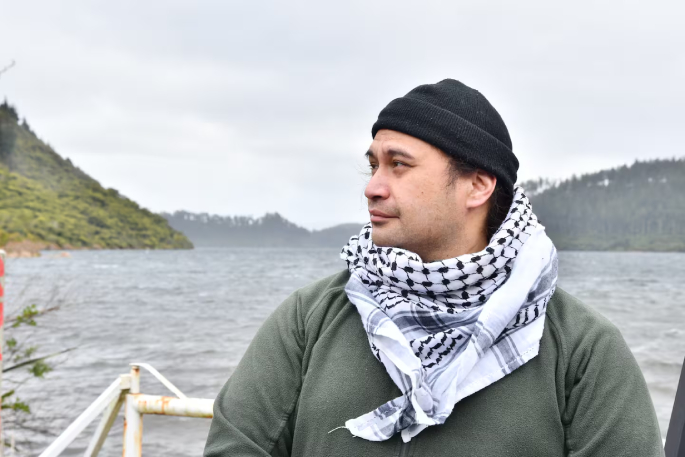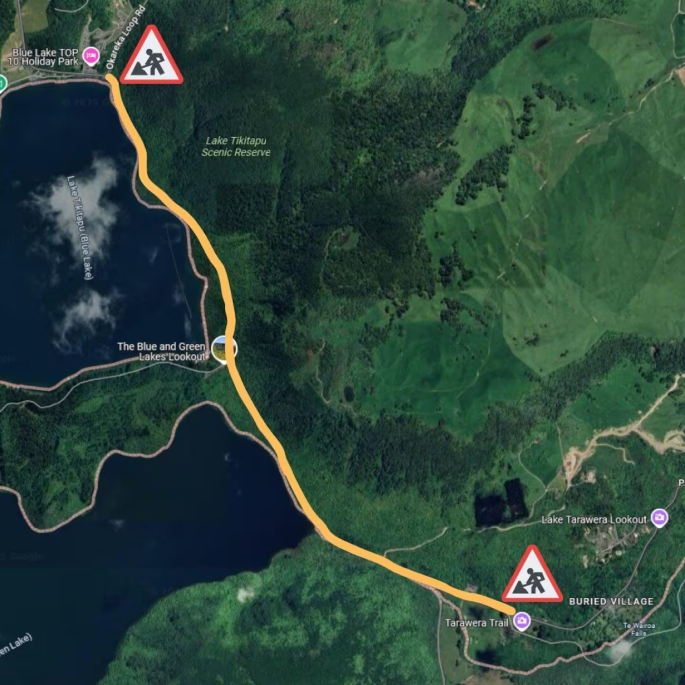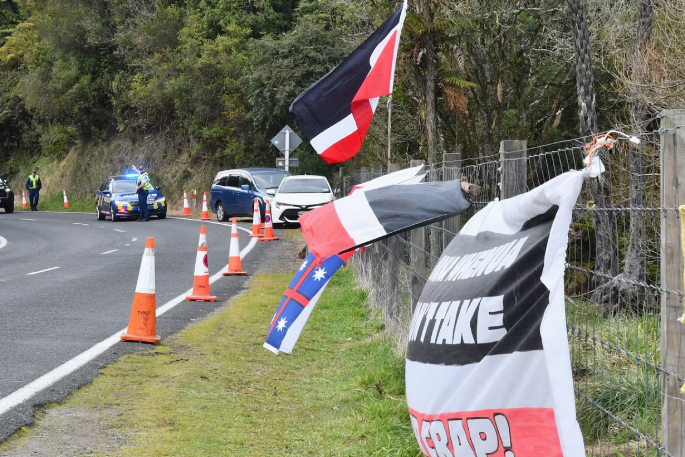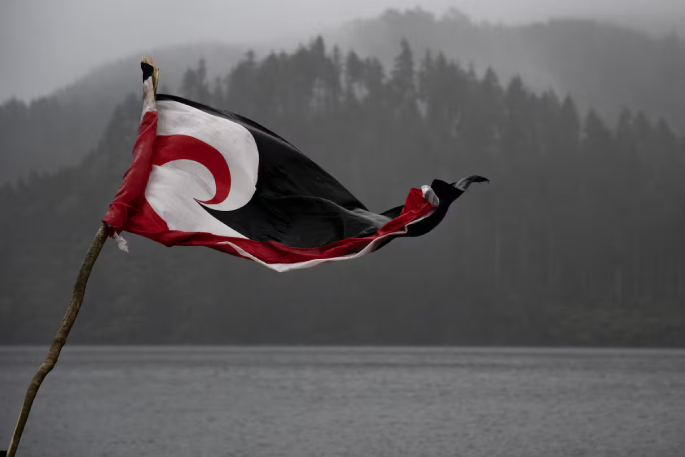Police say they will be present “alongside council staff” at a tapu Rotorua lake tonight as work on a controversial pipeline resumes.
It comes as protesters gather at Lake Rotokākahi and an iwi group makes a last-minute legal bid to stop construction work.
Rotorua Lakes Council contractors are due to resume work tonight to enable the last 1.3km of pipeline in the Tarawera Sewerage Scheme to resume being laid.
Opposition to the project, including from the group that oversees the iwi-owned lake, has forced work to pause several times.
A court-ordered injunction in November banned interference with construction.
The project would connect hundreds of Tarawera households to the town sewerage system and aimed to reduce lake pollution.
Protesters say the pipeline’s path past Lake Rotokākahi puts the sacred lake at risk of environmental damage and desecrates a wāhi tapu area where some 120 tipuna perished in the 1886 Mt Tarawera eruption.
The lake is overseen by the Rotokākahi Board of Control.
Board spokesman Te Whatanui Leka Taumalolo Skipwith said in a Friday statement it had applied in the Environment Court for “a declaration that the council required a resource consent to install the pipe, and for enforcement to halt works until the resource consent is obtained”.
“As mana i te whenua we have consistently opposed the council bringing the sewage pipe through here,” he said.
Protests began in January last year, with a handful of people involved. A hīkoi in August seeking the pipeline to be rerouted attracted about 100 people.
 Signage during the January protest at Lake Rotokākahi. Photo / Andrew Warner
Signage during the January protest at Lake Rotokākahi. Photo / Andrew Warner
Rotorua Lakes Council has said alternative pipeline routes were not feasible and it was legally bound to continue after “extensive” community consultation over many years.
Protesters have occupied lakeside Māori land parallel to the Tarawera Rd construction site for months. Skipwith previously told Local Democracy Reporting it was being referred to as “another Ihumātao”.
His Friday statement claimed the council did not obtain a resource consent as required under the District Plan and had given itself a permitted activity consent for minor activities.
“But the proposed activities are not minor,” Skipwith said.
 Rotokākahi Board of Control spokesman Te Whatanui Leka Skipwith at the lake edge. Photo / Laura Smith
Rotokākahi Board of Control spokesman Te Whatanui Leka Skipwith at the lake edge. Photo / Laura Smith
The Environment Court confirmed proceedings were filed late on Friday afternoon, and the council was served notice at the same time.
A judge would review the proceedings on Monday and issue directions “in due course”.
Council infrastructure and environment group manager Stavros Michael told the Rotorua Daily Post it was not appropriate for the council to comment on the board’s application, as it awaited directions.
In response to Skipwith, he said the council did not grant itself a resource consent for the work but recorded its decision to not require one as a permitted activity.
He said the council planned to progress with works, at this stage, and had asked police to assist if required to ensure injunction compliance.
The council said last week a section of Tarawera Rd would be temporarily closed from 8pm Monday while the worksite near Lake Rotokākahi was re-established. Emergency services would be able to pass through.
It aimed to reopen one lane by 7am Tuesday.
Michael said the council had engaged with iwi and mana whenua during the pause to address concerns about the work near Lake Rotokākahi.
“We respect this area and its significance to iwi and mana whenua.”
Mitigation measures taken included a mana whenua-appointed cultural monitor to give contractors guidance; creating a process for pipeline faults to trigger a pump station pause and alert mana whenua; having mana whenua participate in any remedial actions required and having a council budget for them.
A mana whenua response group would be set up for long-term monitoring of the reticulation network performance and future planning for the Tarawera catchment.
Michael said people could still have reasonable access to their whenua and the lake during construction.
The project was “vital” to protect the environment and all consultation indicated “the majority of the community wish to protect the lake”.
 A section of Tarawera Rd will be temporarily closed from 8pm on February 24 (from the intersection of Ōkāreka Loop/Tarawera Rds to the Tarawera Trail carpark), while the worksite near Lake Rotokākahi is re-established. Image / Rotorua Lakes Council
A section of Tarawera Rd will be temporarily closed from 8pm on February 24 (from the intersection of Ōkāreka Loop/Tarawera Rds to the Tarawera Trail carpark), while the worksite near Lake Rotokākahi is re-established. Image / Rotorua Lakes Council
The pipe began being laid under Tarawera Rd in March 2023. The council has estimated it would take four weeks to complete the final 1.3km. CCTV and security would be on site.
“We respect the right to peaceful protest but must also ensure the safety of contractors and the public when work resumes.”
Injunction rules
After a failed attempt, the council successfully applied for the injunction late last year, naming the board and “persons unknown” as respondents.
It banned various kinds of interference with the works, personnel or vehicles and limited who could be in the active work zone.
The boat ramp and section of land beside it, which has been used by protesters, was excluded from the injunction area.
 Traffic was managed on Tarawera Rd during a hīkoi to Lake Rotokākahi last year. Photo / Laura Smith
Traffic was managed on Tarawera Rd during a hīkoi to Lake Rotokākahi last year. Photo / Laura Smith
The injunction order laid out allegations of unknown people preventing digging and drilling at the worksite, interfering with security fencing and threatening contractors in August, forcing a decision to postpone works.
Board of Control co-chairman Wally Lee told the court it had “remained peaceful” and had “clear rules for all those who attend our noho whenua”.
Police prepared to step in
A Rotorua Police statement on Monday afternoon said officers would be present “alongside council staff” at the lake on Monday night, and in the coming days, as work resumed.
Area commander inspector Herby Ngawhika earlier said the police role was to ensure safety and uphold the law, while recognising the lawful right to protest.
“This has to be balanced against the rights of individuals to go about their daily business without being interfered with by protest action.”
Police actions and number of officers deployed were “always dictated by the situation”, he said.
Police would respond appropriately to disorder or public safety issues, and the organisation was well-practised at attending protest events.
‘Complex and sensitive’
Tūhourangi Tribal Authority chairwoman Kirikowhai Mikaere said the scheme restarting was a “complex and sensitive development for our whānau”.
The authority’s rohe includes both lakes. Mikaere said views within the iwi were diverse.
“This kaupapa is about protecting Lake Tarawera. Without action, our taonga is at risk of irreparable pollution. But we all agree that this action cannot come at the detriment of our other lakes and whenua.”
It would continue to work with the council on mitigations and hold it accountable.
The iwi respected both peaceful protesters and organisations involved in the project. It did not support wilful damage or threats against those involved in the construction, and prioritised keeping its whānau safe.
LDR is local body journalism co-funded by RNZ and NZ On Air.




2 comments
Hmmm
Posted on 25-02-2025 11:09 | By Let's get real
The stupidity is that we can allow people to prevent works for the greater good of the community because "something happened over there somewhere".
Deeming a tract of land or an entire lake "off limits" because we can't be certain where bodies might be, is ridiculous.
Nobody wants to disturb a burial site, but it's like saying you can't use a cruise ship in the Pacific because the Titanic went down in the Atlantic and they're connected.
Presumably the waste and defecation that HAS happened into the lake over generations is fine, but we must prevent something that "probably" will never happen.
@ Let's get real
Posted on 25-02-2025 22:35 | By Yadick
Hear, hear. Good comment. Enough stupidity is enough.
Leave a Comment
You must be logged in to make a comment.